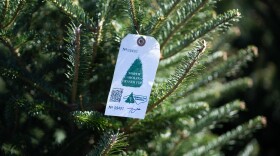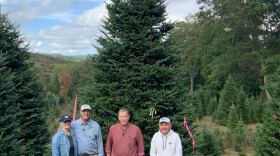Thanksgiving weekend is one of the biggest of the year for Christmas tree sales. And there’s a good chance many of the trees bought this weekend will come from North Carolina. The state grows almost 20 percent of the nation’s Christmas trees, and is second to Oregon in Christmas tree production.
Bill Glenn of the North Carolina Department of Agriculture says wholesale tree sales have been strong so far this season, but that the state has fewer trees to sell.
"In the spring of 2002 we had a freeze that hurt a bunch of our little baby plants," he explained.
Glenn said a series of floods and hurricanes in the summer of 2004 also damaged many young Christmas trees. Since most Christmas trees take around 12 or 13 years to grow, Glenn said the trees harmed by weather events more than 10 years ago are missing from this year's crop.
But despite the smaller yield, with still more than 4 million trees, he said the state should have enough to meet demand.
"We still have a good crop of trees," he said. "We had several years of overproduction, and now we're back to what I'm thinking is going to be just about right."
Glenn says the state's growers are aiming for $100 million in sales of Christmas trees and greenery.
The North Carolina Christmas Tree Association’s Jennifer Greene said sales are holding steady, but finding enough labor is a constant challenge for the state's growers, especially during the harvesting season.
"It’s a short window of opportunity to get them harvested when they need to be and get them shipped where they need to be," she said.
Greene said the industry relies on migrant labor for harvesting and caring for the trees throughout the year.
"A lot of people don't realize how labor intensive Christmas trees are," she said. "They have to be fertilized and they have to be shaped, and so it's a very intense process."
North Carolina's most popular tree is the Fraser Fir, which is only native to Western North Carolina and very small parts of Tennessee and Virginia.
Glenn said consumers like the Fraser Fir for its "perfect Christmas-tree shape," its strong aroma and because it keeps its needles the longest of all Christmas trees produced in the U.S.
"It's a true North Carolina treasure," Glenn said.









